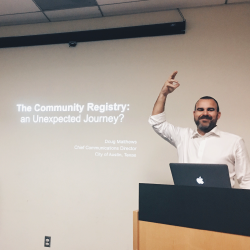
September Open Gov & Civic Tech Meetup Recap-Data.World
This past Monday’s Open Government and Civic Technology meetup had 2 guest speakers present. Doug Matthews, Chief Communication Officer, covered the state of the community registry. Jonathan Ortiz, Data Scientist and Knowledge Engineer at Data.world, spoke on the startup, his census project, and linked data.
Getting started! 🙌🏼 pic.twitter.com/OmIGqIydo5
— Open Austin (@openaustin) September 20, 2016
Community Registry: an Unexpected Journey
Doug Matthews started the meeting by outlining the current state of the Austin Community Registry. As described by data.gov—a community registry is a tool that allows for “neighborhoods and others to be notified of issues relating to their area”.
Kicking off the Convo on a community registry. #civictech pic.twitter.com/7jYjw0oKvF
— Open Austin (@openaustin) September 20, 2016
Matthews highlighted the current complexities of filling out the Austin registry and keeping it up to date. His slide examples showed how time consuming and frustrating current processes are. It is clear that a better and more interactive solution is needed. Streamlining the registry application and giving it more interactive capabilities would increase the value and functionality of this important community resource.
Because of this, Google Fiber and the city are partnering up to push this project forward and find help to create the best solution for Austin.
There are a lot of challenges and opportunities in working on the community registry. You can get engaged and help tackle them by checking out the open project issue on github or reaching out to Doug by emailing douglas.matthews@austintexas.gov.
View and Download Doug Matthews slides.
Open Data Wants to Be Linked
The night concluded with Jonathan Ortiz, a data scientist from Data.world.
Data.world is a public benefit company working to break down the barriers between data and people. Unlike some companies, they’re not about the visualization or analysis of data. They’re about helping people find the data they need and enabling cross-collaboration.
Jonathan highlighted the sentiment that Data.world is about more than data though. He said, “It’s about making understanding easier”. He also emphasized the benefits of social sharing and data by saying,” We should work together. We should collaborate. We should not duplicate our efforts”.
He continued to explain that a lot of the data, though open and available, is being stood up and posted in silos. This means that other people can’t access it and might not even know about its existence. Having access to more relevant data could allow for more thorough research.
"Data providers are disconnected from data users. They load it in and you pull it out." - Jonathon Ortiz of @datadotworld pic.twitter.com/z16mIT9iVs
— Open Austin (@openaustin) September 20, 2016
Having a social platform isn’t the only way to share data though. Linked data holds many possibilites and it’s something the folks at Data.world are working on. Linked data is what makes up the semantic web, which is also sometimes called a Research Description Framework or RDF. When you upload your data to Data.world there is the opportunity to link it.
Linking data joins the data sets to others by following a set data model. This enables the data to be better understood by machines and thus allows users to discover more insights.
With the linked data technology, Jonathan and Data.world partnered with the US Census Bureau. They aim to help data users by enriching the analyses that need US demographic information. They are doing this by working to ingest the American Community Survey in a linked data format. The project is ongoing.
You can get an invite for Data.world and share some of your own data sets by visiting the following link: [https://data.world/preview-signup]
View and download the full presentation that Jonathan gave.
Continue the Conversation
As always:
Join the Open Austin community on Slack: Get an invite
RSVP for our future events on Meetup: RSVP
Follow us on Twitter
& Like us on Facebook